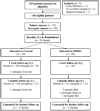Randomized controlled trial of SPIRIT: an effective approach to preparing African-American dialysis patients and families for end of life
- PMID: 19205027
- PMCID: PMC2719959
- DOI: 10.1002/nur.20320
Randomized controlled trial of SPIRIT: an effective approach to preparing African-American dialysis patients and families for end of life
Abstract
This randomized controlled trial tested an intervention, Sharing Patients' Illness Representations to Increase Trust (SPIRIT), designed to enhance communication regarding end-of-life care between African Americans with end-stage renal disease (ESRD) and their chosen surrogate decision makers (N = 58 dyads). We used surveys and semi-structured interviews to determine the feasibility, acceptability, and preliminary effects of SPIRIT on patient and surrogate outcomes at 1 week and 3 months post-intervention. We also evaluated patients' deaths and surrogates' end-of-life decision making to assess surrogates' perceptions of benefits and limitations of the SPIRIT while facing end-of-life decisions. We found that SPIRIT promoted communication between patients and their surrogates and was effective and well received by the participants.
(c) 2009 Wiley Periodicals, Inc.
Figures



References
-
- Blank RH, Merrick JC. End-of-life decision making: A cross-national study. Cambridge, MA: The MIT Press; 2005.
-
- Carr D, Khodyakov D. End-of-life health care planning among young-old adults: An assessment of psychosocial influences. Journal of Gerontology. 2007a;62(2):S135–S141. - PubMed
Publication types
MeSH terms
Grants and funding
LinkOut - more resources
Full Text Sources
Medical
